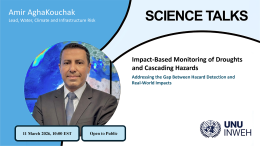On 16 July 2023, leaders and experts convened at UN headquarters in New York for the Fourth Global Conference on Climate and SDG Synergies, with 4,000 viewers online. It discussed progress and approaches for delivering jointly on these two critical agendas to transition towards just, equitable, and climate compatible pathways. UNU-IAS contributed expertise and evidence-based inputs focused on just transition and integrated solutions.
The conference was conducted in association with the 2023 UN High-Level Political Forum on Sustainable Development (10–19 July, New York). It was convened by the UN Department of Economic and Social Affairs (UNDESA) and the UN Framework Convention on Climate Change (UNFCCC).
Shinobu Yume Yamaguchi (Director, UNU-IAS) delivered an expert intervention as part of a parallel session on the topic “A Just, Equitable, and Net-Zero Transition — How to Get It Right?”. She emphasised that integrated and environmentally sustainable solutions were essential to achieve interlinked priorities such as economic prosperity, energy security, global health, and education.
Drawing on recent UNU-IAS Policy Briefs, Prof. Yamaguchi urged policymakers to (i) combine climate and SDG initiatives with social protection measures, (ii) place inclusion at the centre of financial strategies, and (iii) develop consistent mechanisms for measuring just transition, environmental sustainability, and well-being. She underlined the key role of education as a catalyst for achieving all of the SDGs, calling for capacity building and training to be at the core of efforts to strengthen climate action. UNU-IAS is advancing institutional capacity building through a new postgraduate degree specialisation on the Paris Agreement, which will launch in September 2023.
Discussion in the session identified other key enablers for realising synergies, including inclusive decision-making and science advisors who can help to bridge silos in governments. Panellists emphasised the need for additional metrics that go beyond GDP.
The session followed an opening segment that featured statements by Ministers, high-level representatives, and heads of UN agencies, as well as stakeholders from business, academia, and civil society. They recognised increasing awareness of synergistic action and called for greater ambition ahead of critical upcoming milestones in 2023. These include the SDG Summit (18–19 September), the Climate Ambition Summit (20 September), and the UN Climate Change Conference (30 November – 12 December). It was recognised that principles of just transition should be at the core of integrated efforts on climate and the SDGs.
Two other parallel sessions addressed climate action for social and economic change (Parallel Session 2), and unlocking finance and partnerships (Parallel Session 3). A closing plenary discussed the key outcomes of each session, underlining the importance of participatory policymaking and just transition processes that benefit all, ensuring that no one is left behind. Participants were encouraged to build on the momentum of the conference to break down silos and enhance collaboration.
Video Recording
Recordings of each session are available courtesy of UN Web TV:
- Opening and High-Level Segment
- Parallel Session 1: A just, equitable and net-zero transition – how to get it right?
- Parallel Session 2: Climate action as an avenue for social and economic change – how to get all stakeholders on board?
- Parallel Session 3: Unlocking finance and partnerships for climate and SDG action – how can it be done?
- Closing Plenary: Breaking through to a better future for all
Conference Summary
A conference summary has been made available by the co-convenors, UN DESA and the UNFCCC Secretariat.
Background
This event built on the outcomes of three previous synergy conferences. The first Global Conference on Strengthening Synergies between the Paris Agreement and the 2030 Agenda took place in April 2019 in Copenhagen. The second conference was organised as a virtual Global Synergies Consultation during May–June 2020, comprising three separate online events. In July 2022 the third conference was held at UNU in Tokyo, bringing together over 2,000 leaders and experts to share insights, best practices, and win-win solutions from across the globe. UNU-IAS led one of the parallel sessions, as well as side events and a workshop engaging high school students to scale up youth-led action.



